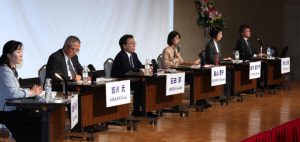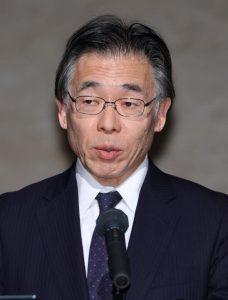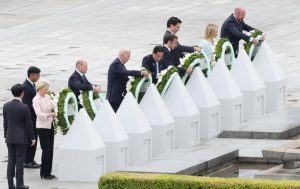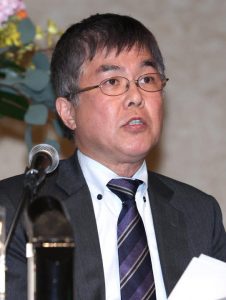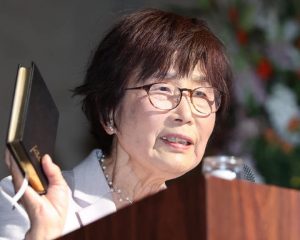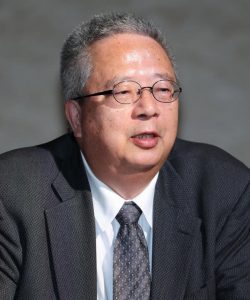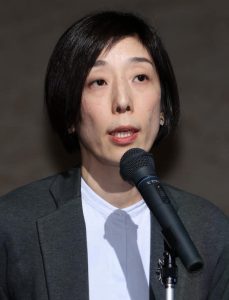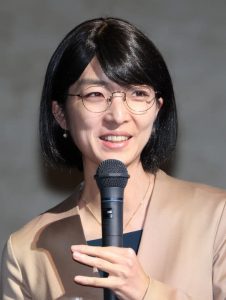How to respond to escalating nuclear threat: International symposium in Hiroshima discusses post-summit challenges
Dec. 18, 2023
by Yumi Kanazaki, Yumi Morita, Kana Kobayashi, and Kyoko Niiyama, Staff Writers
On December 10, an international symposium — Confronting the Danger of Nuclear War: Hiroshima, Nagasaki, G7 Summit and the Future — was held at the International Conference Center Hiroshima, located in the city’s Naka Ward. The symposium was hosted by the Hiroshima Peace Institute at Hiroshima City University, the Chugoku Shimbun, and the Research Center for Nuclear Weapons Abolition (RECNA) at Nagasaki University. The summit meeting of the G7 (Group of Seven industrialized nations), held earlier in the year in May, drew attention for a variety of reasons, including the “Hiroshima Vision” consensus document on nuclear disarmament and the surprise visit by Ukraine President Volodymyr Zelenskyy. Looking back at the summit, the symposium’s panel of researchers, civic activists, and one journalist shared their views with around 200 members of the public regarding the challenges facing the A-bombed cities.
Atsushi Ishida, Professor, University of Tokyo
Based on the “Hiroshima Vision,” a policy statement on nuclear disarmament agreed upon at the G7 Hiroshima Summit, I want to consider the question of exactly whose security is assured by national security policies.
The G7 leaders declared in the Hiroshima Vision that, “We reaffirm our commitment to the ultimate goal of a world without nuclear weapons with undiminished security for all.” I now refer to the document’s Japanese version, tentatively translated by Japan’s Ministry of Foreign Affairs.
In Japanese, the phrase “for all” signifies every human being in the world. However, after reviewing the final document adopted at the 1978 Special Session of the United Nations General Assembly devoted to Disarmament, I found the meaning to be that the security of all nations with authority to conclude treaties on military armaments shall not be infringed. The idea is centered on security at the national level.
Japan’s National Security Strategy, which garnered Cabinet approval last year, designates essential national interests as being maintenance of the country’s sovereignty and independence, defense of its territorial integrity, and securing of the safety of life, person, and properties of its nationals. However, is there really no risk of “the horrors of war through the action of government,” a statement that appears in the Japanese Constitution’s preamble, as it pertains to the exercise of the right of self-defense?
War disasters are also considered to entail “equal contribution by nationals for survival of the nation” in times of war. In that way, based on a 1968 Japan Supreme Court decision, all citizens of Japan are deemed to have no option in war but “endure the sacrifices of their lives, person, and properties.”
However, if nations are not required to compensate people for their sacrifice, the constraints used to avoid war would grow that much weaker. Conversely, if a political structure were put forth to force governments to carefully consider the decision to employ its armed forces from the perspective of protecting its citizens, tensions among nations could be reduced.
The history of non-use of nuclear weapons has continued since the atomic bombings of Hiroshima and Nagasaki, but global nuclear powers have repeatedly signaled their intent to use the weapons. Another use of such weapons could very well lead to unconstrained escalation of war. While not touched on in the Hiroshima Vision, policies are in place to ensure that the history of non-use of nuclear weapons continues. Such policies are designed to strengthen the “nuclear taboo,” which is marked by the humanitarian awareness to render as taboo the use of nuclear weapons, despite it not clearly being illegal.
Nuclear weapons do not allow for the respect of human dignity. Our affirmation and sharing of what that means for each individual will reinforce the nuclear taboo.
Atsushi Ishida
Born in Tokyo in 1962, Mr. Ishida earned a doctoral degree in political science at the University of Chicago after graduating from the Faculty of Law at the University of Tokyo. Serving in his current position since 2005, his résumé includes serving in such posts as director of the Japan Association of International Relations.
Kimiaki Kawai, Professor / Vice Director, RECNA, Nagasaki University
Japan’s national security relies on U.S. nuclear weapons as a foundation, given the threat of the use of such weapons. The nuclear deterrence theory defines nuclear weapons as being necessary to prevent others from using the weapons. The concept, however, does not provide a theoretical answer to the question about how a hostile act from another country should be handled if deterrence based on possession of a nuclear arsenal is ineffective.
One possible answer is “use of nuclear weapons.” Following a failure of nuclear deterrence, a certain level of nuclear retaliation, at the very least, has to be assumed.
Let’s consider whether “responsible” use of nuclear weapons is a viable option. In the “Hiroshima Vision,” the word “responsible” is oft repeated. Obviously, the use of nuclear weapons by Russia would never be acceptable. But if that is the case, would the use of nuclear weapons by G7 nuclear weapons states be considered a “responsible” act?
In 1996, the International Court of Justice (ICJ) released its advisory opinion on the Legality of the Threat or Use of Nuclear Weapons, which noted that none of the states advocating the legality of the use of nuclear weapons under certain circumstances, including the “clean” use of smaller, low-yield, tactical nuclear weapons, has indicated what would be the precise circumstances justifying such use, supposing such limited use was indeed feasible. The opinion also highlighted that “no” countries have shown that limited use would not likely escalate into “all-out use of high-yield nuclear weapons.” Nuclear deterrence is not only dangerous but “fragile.” The potential consequences of nuclear weapons use after a failure of nuclear deterrence are obvious from the experiences of Hiroshima and Nagasaki. In that sense, the idea of “responsible” use of nuclear weapons is folly.
G7 leaders visited Peace Memorial Park in Hiroshima, offered flowers at the Cenotaph for the A-bomb victims, and met with an A-bomb survivor. The summit was important for demonstrating to the international community the inhumanity of nuclear weapons and the importance of nuclear disarmament efforts. Those efforts should not be allowed to end as mere abstraction. We need to reaffirm that the only option for guaranteeing nuclear weapons are never used again is their “elimination.”
Kimiaki Kawai
Born in Kanagawa Prefecture in 1965, Mr. Kawai graduated with a doctoral degree from Nagasaki University’s Graduate School of Global Humanities and Social Sciences. He serves in his current position after a career that included work as a chief researcher at the Toda Peace Institute.
Gen Kikkawa, Specially Appointed Professor, Hiroshima Peace Institute, Hiroshima City University
Since February of last year, Russia has carried out a war of aggression against Ukraine. How will the war affect the international order of peace?
Just prior to its invasion of Ukraine, Russia granted nationhood to the Lugansk and Donetsk regions (controlled by pro-Russian separatists) in eastern Ukraine. The country then annexed four Ukrainian states in the east and south, claiming that the act was a response to public opinion expressed through referenda.
In the 1990s, after the end of the Cold War, Yugoslavia was split into six nations and the Soviet Union into 15. The rationale behind independence was “the people’s right of self-determination.”
To prevent separatism from spreading among other ethnic autonomous communities inside Yugoslavia, the former European Community (EC) established a requirement for recognition that any “federal republic must able to prove the will of its citizens through referendum.”
Kosovo was an exception. Western nations supported the independence of that autonomous region, located within the Republic of Serbia. The International Court of Justice also released an advisory opinion on the issue, which made clear that, in general, international law did not prohibit the region’s independence. In May of this year, Russian President Vladimir Putin justified annexation of the four Ukrainian states in the south and east by referencing the precedent of Kosovo’s independence.
Movements seeking referenda on independence will likely spread across the world. Authoritarianism and dictatorships can be expected to grow bolder. One of the reasons for that is China. Another reason is “nationalism.” An “America-first” sentiment reared its head during the U.S. Trump administration. In the Netherlands, an anti-immigrant political party has recently made significant gains. The world’s population has surpassed eight billion people. Amid the worsening situation surrounding global warming and climate change, nationalism has gained a foothold. In East Asia, military spending has grown by 50 percent over the past decade, but there is no framework for control of militaries in the region. The reality is that peace is barely being maintained through a balance of military power.
Gen Kikkawa
Born in Hiroshima in 1951, Mr. Kikkawa withdrew from his university after completion of the required credits at the Graduate Law School at Hitotsubashi University with a doctoral degree in law. His resume includes stints as a professor at Sophia University and director of the Hiroshima Peace Institute, Hiroshima City University.
Michiko Tanaka, Senior Staff Writer, the Chugoku Shimbun
In recent years, nuclear disarmament has faced stiff headwinds. Russia’s invasion of Ukraine has exacerbated the situation. With multiple countries calling for the United States to place nuclear weapons within their borders, the world is ramping up its reliance on the weapons. The G7 happens to be made up of a group of nations that rely on nuclear weapons. Since it was decided that the acting leaders of those nations would gather in Hiroshima to attend the summit meeting, we also were inspired. We wanted to report on the nuclear catastrophe and engender effective debate.
And what were the results? A special document on nuclear disarmament was ultimately put together, but it lacked originality. To the contrary, while the document denounced the nuclear threat posed by Russia, it defined the nuclear weapons possessed by some of the G7 nations as “serving defensive purposes,” thereby offering unabashed affirmation of nuclear deterrence.
Nuclear deterrence is a theory of intimidation that threatens nuclear retaliation for any nuclear attack. It is the exact opposite of the wishes of A-bomb survivors, who insist that no nation should be allowed to possess any nuclear weapons at all, and thus the only solution for saving our world is to eliminate the weapons. As the summit’s host nation, the government of A-bombed Japan put together the “Hiroshima Vision,” differentiating its position from that of the A-bomb survivors. We had the impression that the A-bombed city was being challenged by its own national government.
However, the messages that the G7 leaders wrote in a guestbook at the Hiroshima Peace Memorial Museum revealed their personal feelings. I want to believe they took meaning from the museum’s exhibit information. International tourists continue to line up in front of the museum day after day. With that, I assume the summit was somehow effective in raising public awareness about the nuclear issue.
The A-bombed city has the capacity to communicate the nuclear tragedy as well as the obligation to convey the resentments of A-bomb victims. As the numbers of A-bomb survivors and those who experienced the war continue to decline, I fear Hiroshima’s message might weaken over time. The nuclear crisis continues. The determination of people in the A-bombed city will also be tested. But giving up is not an option.
Michiko Tanaka
Born in Chiba Prefecture in 1976, Ms. Tanaka graduated from the Kobe City University of Foreign Studies. She started work at the Chugoku Shimbun in 2000. She has served in her current post since 2022, after working in the company’s news department and at its Tokyo branch office, among other roles.
Sumiko Hatakeyama, Co-chair, NGO Peace Boat
Civil society’s activities, including participation in international conferences and affecting policy recommendations, are growing more active. One such effort is the “Civil Society 7 (C7).” As an initiative officially recognized by the government, the C7 framework was established prior to the G7 summit meeting.
At the C7 Summit, held ahead of the G7 Hiroshima Summit, the Nuclear Disarmament working group was added to the five existing working groups that continued from last year’s C7 Summit in Germany, including the Climate and Environmental Justice group. I served as coordinator for the Nuclear Disarmament working group. To take advantage of the G7 Hiroshima Summit as an opportunity to make further progress toward the elimination of nuclear weapons, we held a series of debates and completed a set of recommendations, which were submitted directly to Japan Prime Minister Fumio Kishida.
Nevertheless, our recommendations were not incorporated into the summit’s “Hiroshima Vision,” which instead emphasized its support of the policy of nuclear deterrence. So disappointed by that turn of events, I experienced an emotion akin to rage.
Just four days ago, I returned from a round-the-world trip on the Peace Boat over a period of three-and-a-half months. The ship had many crew members from Ukraine, including the captain. During the journey, one of the crew received news of the death of an older brother in the war. The crew member had a friend in Gaza, part of the Palestinian territories, who had been on the run for two months there, with the family of the friend’s younger sister buried alive under a collapsed building.
As the lives of people are stolen without protection from international law, the current practice in the international community whereby G7 nations and other superpowers set the rules must be questioned at a fundamental level. To that end, it is necessary to think about how to fill the gulf that exists between the Hiroshima Vision and the C7 recommendations.
The Treaty on the Prohibition of Nuclear Weapons (TPNW) was established because civil society continued to call for it. I hope to someday witness the power of civil society transcend national interests and grow to the point that it is competitive enough to counter military power and nationalism.
Sumiko Hatakeyama
Born in Saitama Prefecture in 1989, Ms. Hatakeyama graduated in Politics, Psychology, and Sociology from the University of Cambridge in the United Kingdom and with a doctorate in the history of science and technology from the University of Pennsylvania in the United States.
Keiko Ogura, A-bomb survivor
Keiko Ogura, 86, an A-bomb survivor who met with summit leaders at the Hiroshima Peace Memorial Museum, took the podium. She showed the attendees a panoramic photograph of the ruined Hiroshima City and shared her experiences in the atomic bombing at the age of eight as well as her memories of family.
Ms. Ogura revealed that she had met the G7 leaders, their spouses, leaders from the nations that had been invited to the summit, and Ukrainian President Volodymyr Zelenskyy four times at the museum. “President Zelenskyy and I stood together in front of the ‘White Panorama’ (a computer generated exhibit showing Hiroshima’s instantaneous destruction in the bombing). Thinking of what happened nearly eighty years ago and what is happening today, I had to fight back tears.”
She revealed a pocket diary that had been sent to her last month by U.S. President Joe Biden as a token of his gratitude. She now uses it as an autograph book for visitors from around the world. She stressed that people worldwide are hungry for knowledge about the atomic bombing of Hiroshima. While acknowledging the difficulty of achieving a world without nuclear weapons, she called on the audience to act. “Instead of falling into despair, let’s continue to think about what we can achieve together,” said Ms. Ogura.
(Originally published on December 18, 2023)
On December 10, an international symposium — Confronting the Danger of Nuclear War: Hiroshima, Nagasaki, G7 Summit and the Future — was held at the International Conference Center Hiroshima, located in the city’s Naka Ward. The symposium was hosted by the Hiroshima Peace Institute at Hiroshima City University, the Chugoku Shimbun, and the Research Center for Nuclear Weapons Abolition (RECNA) at Nagasaki University. The summit meeting of the G7 (Group of Seven industrialized nations), held earlier in the year in May, drew attention for a variety of reasons, including the “Hiroshima Vision” consensus document on nuclear disarmament and the surprise visit by Ukraine President Volodymyr Zelenskyy. Looking back at the summit, the symposium’s panel of researchers, civic activists, and one journalist shared their views with around 200 members of the public regarding the challenges facing the A-bombed cities.
Keynote speech
History of “non-use” must continue by making nuclear weapons taboo
Atsushi Ishida, Professor, University of Tokyo
Based on the “Hiroshima Vision,” a policy statement on nuclear disarmament agreed upon at the G7 Hiroshima Summit, I want to consider the question of exactly whose security is assured by national security policies.
The G7 leaders declared in the Hiroshima Vision that, “We reaffirm our commitment to the ultimate goal of a world without nuclear weapons with undiminished security for all.” I now refer to the document’s Japanese version, tentatively translated by Japan’s Ministry of Foreign Affairs.
In Japanese, the phrase “for all” signifies every human being in the world. However, after reviewing the final document adopted at the 1978 Special Session of the United Nations General Assembly devoted to Disarmament, I found the meaning to be that the security of all nations with authority to conclude treaties on military armaments shall not be infringed. The idea is centered on security at the national level.
Japan’s National Security Strategy, which garnered Cabinet approval last year, designates essential national interests as being maintenance of the country’s sovereignty and independence, defense of its territorial integrity, and securing of the safety of life, person, and properties of its nationals. However, is there really no risk of “the horrors of war through the action of government,” a statement that appears in the Japanese Constitution’s preamble, as it pertains to the exercise of the right of self-defense?
War disasters are also considered to entail “equal contribution by nationals for survival of the nation” in times of war. In that way, based on a 1968 Japan Supreme Court decision, all citizens of Japan are deemed to have no option in war but “endure the sacrifices of their lives, person, and properties.”
However, if nations are not required to compensate people for their sacrifice, the constraints used to avoid war would grow that much weaker. Conversely, if a political structure were put forth to force governments to carefully consider the decision to employ its armed forces from the perspective of protecting its citizens, tensions among nations could be reduced.
The history of non-use of nuclear weapons has continued since the atomic bombings of Hiroshima and Nagasaki, but global nuclear powers have repeatedly signaled their intent to use the weapons. Another use of such weapons could very well lead to unconstrained escalation of war. While not touched on in the Hiroshima Vision, policies are in place to ensure that the history of non-use of nuclear weapons continues. Such policies are designed to strengthen the “nuclear taboo,” which is marked by the humanitarian awareness to render as taboo the use of nuclear weapons, despite it not clearly being illegal.
Nuclear weapons do not allow for the respect of human dignity. Our affirmation and sharing of what that means for each individual will reinforce the nuclear taboo.
Atsushi Ishida
Born in Tokyo in 1962, Mr. Ishida earned a doctoral degree in political science at the University of Chicago after graduating from the Faculty of Law at the University of Tokyo. Serving in his current position since 2005, his résumé includes serving in such posts as director of the Japan Association of International Relations.
Commentary
Idea of “responsible” use of nuclear weapons is folly
Kimiaki Kawai, Professor / Vice Director, RECNA, Nagasaki University
Japan’s national security relies on U.S. nuclear weapons as a foundation, given the threat of the use of such weapons. The nuclear deterrence theory defines nuclear weapons as being necessary to prevent others from using the weapons. The concept, however, does not provide a theoretical answer to the question about how a hostile act from another country should be handled if deterrence based on possession of a nuclear arsenal is ineffective.
One possible answer is “use of nuclear weapons.” Following a failure of nuclear deterrence, a certain level of nuclear retaliation, at the very least, has to be assumed.
Let’s consider whether “responsible” use of nuclear weapons is a viable option. In the “Hiroshima Vision,” the word “responsible” is oft repeated. Obviously, the use of nuclear weapons by Russia would never be acceptable. But if that is the case, would the use of nuclear weapons by G7 nuclear weapons states be considered a “responsible” act?
In 1996, the International Court of Justice (ICJ) released its advisory opinion on the Legality of the Threat or Use of Nuclear Weapons, which noted that none of the states advocating the legality of the use of nuclear weapons under certain circumstances, including the “clean” use of smaller, low-yield, tactical nuclear weapons, has indicated what would be the precise circumstances justifying such use, supposing such limited use was indeed feasible. The opinion also highlighted that “no” countries have shown that limited use would not likely escalate into “all-out use of high-yield nuclear weapons.” Nuclear deterrence is not only dangerous but “fragile.” The potential consequences of nuclear weapons use after a failure of nuclear deterrence are obvious from the experiences of Hiroshima and Nagasaki. In that sense, the idea of “responsible” use of nuclear weapons is folly.
G7 leaders visited Peace Memorial Park in Hiroshima, offered flowers at the Cenotaph for the A-bomb victims, and met with an A-bomb survivor. The summit was important for demonstrating to the international community the inhumanity of nuclear weapons and the importance of nuclear disarmament efforts. Those efforts should not be allowed to end as mere abstraction. We need to reaffirm that the only option for guaranteeing nuclear weapons are never used again is their “elimination.”
Kimiaki Kawai
Born in Kanagawa Prefecture in 1965, Mr. Kawai graduated with a doctoral degree from Nagasaki University’s Graduate School of Global Humanities and Social Sciences. He serves in his current position after a career that included work as a chief researcher at the Toda Peace Institute.
Report
Rise of nationalism shakes peace
Gen Kikkawa, Specially Appointed Professor, Hiroshima Peace Institute, Hiroshima City University
Since February of last year, Russia has carried out a war of aggression against Ukraine. How will the war affect the international order of peace?
Just prior to its invasion of Ukraine, Russia granted nationhood to the Lugansk and Donetsk regions (controlled by pro-Russian separatists) in eastern Ukraine. The country then annexed four Ukrainian states in the east and south, claiming that the act was a response to public opinion expressed through referenda.
In the 1990s, after the end of the Cold War, Yugoslavia was split into six nations and the Soviet Union into 15. The rationale behind independence was “the people’s right of self-determination.”
To prevent separatism from spreading among other ethnic autonomous communities inside Yugoslavia, the former European Community (EC) established a requirement for recognition that any “federal republic must able to prove the will of its citizens through referendum.”
Kosovo was an exception. Western nations supported the independence of that autonomous region, located within the Republic of Serbia. The International Court of Justice also released an advisory opinion on the issue, which made clear that, in general, international law did not prohibit the region’s independence. In May of this year, Russian President Vladimir Putin justified annexation of the four Ukrainian states in the south and east by referencing the precedent of Kosovo’s independence.
Movements seeking referenda on independence will likely spread across the world. Authoritarianism and dictatorships can be expected to grow bolder. One of the reasons for that is China. Another reason is “nationalism.” An “America-first” sentiment reared its head during the U.S. Trump administration. In the Netherlands, an anti-immigrant political party has recently made significant gains. The world’s population has surpassed eight billion people. Amid the worsening situation surrounding global warming and climate change, nationalism has gained a foothold. In East Asia, military spending has grown by 50 percent over the past decade, but there is no framework for control of militaries in the region. The reality is that peace is barely being maintained through a balance of military power.
Gen Kikkawa
Born in Hiroshima in 1951, Mr. Kikkawa withdrew from his university after completion of the required credits at the Graduate Law School at Hitotsubashi University with a doctoral degree in law. His resume includes stints as a professor at Sophia University and director of the Hiroshima Peace Institute, Hiroshima City University.
Nuclear deterrence is intimidation, the complete opposite of A-bomb survivors’ wishes
Michiko Tanaka, Senior Staff Writer, the Chugoku Shimbun
In recent years, nuclear disarmament has faced stiff headwinds. Russia’s invasion of Ukraine has exacerbated the situation. With multiple countries calling for the United States to place nuclear weapons within their borders, the world is ramping up its reliance on the weapons. The G7 happens to be made up of a group of nations that rely on nuclear weapons. Since it was decided that the acting leaders of those nations would gather in Hiroshima to attend the summit meeting, we also were inspired. We wanted to report on the nuclear catastrophe and engender effective debate.
And what were the results? A special document on nuclear disarmament was ultimately put together, but it lacked originality. To the contrary, while the document denounced the nuclear threat posed by Russia, it defined the nuclear weapons possessed by some of the G7 nations as “serving defensive purposes,” thereby offering unabashed affirmation of nuclear deterrence.
Nuclear deterrence is a theory of intimidation that threatens nuclear retaliation for any nuclear attack. It is the exact opposite of the wishes of A-bomb survivors, who insist that no nation should be allowed to possess any nuclear weapons at all, and thus the only solution for saving our world is to eliminate the weapons. As the summit’s host nation, the government of A-bombed Japan put together the “Hiroshima Vision,” differentiating its position from that of the A-bomb survivors. We had the impression that the A-bombed city was being challenged by its own national government.
However, the messages that the G7 leaders wrote in a guestbook at the Hiroshima Peace Memorial Museum revealed their personal feelings. I want to believe they took meaning from the museum’s exhibit information. International tourists continue to line up in front of the museum day after day. With that, I assume the summit was somehow effective in raising public awareness about the nuclear issue.
The A-bombed city has the capacity to communicate the nuclear tragedy as well as the obligation to convey the resentments of A-bomb victims. As the numbers of A-bomb survivors and those who experienced the war continue to decline, I fear Hiroshima’s message might weaken over time. The nuclear crisis continues. The determination of people in the A-bombed city will also be tested. But giving up is not an option.
Michiko Tanaka
Born in Chiba Prefecture in 1976, Ms. Tanaka graduated from the Kobe City University of Foreign Studies. She started work at the Chugoku Shimbun in 2000. She has served in her current post since 2022, after working in the company’s news department and at its Tokyo branch office, among other roles.
Civil society’s power can transcend national interests
Sumiko Hatakeyama, Co-chair, NGO Peace Boat
Civil society’s activities, including participation in international conferences and affecting policy recommendations, are growing more active. One such effort is the “Civil Society 7 (C7).” As an initiative officially recognized by the government, the C7 framework was established prior to the G7 summit meeting.
At the C7 Summit, held ahead of the G7 Hiroshima Summit, the Nuclear Disarmament working group was added to the five existing working groups that continued from last year’s C7 Summit in Germany, including the Climate and Environmental Justice group. I served as coordinator for the Nuclear Disarmament working group. To take advantage of the G7 Hiroshima Summit as an opportunity to make further progress toward the elimination of nuclear weapons, we held a series of debates and completed a set of recommendations, which were submitted directly to Japan Prime Minister Fumio Kishida.
Nevertheless, our recommendations were not incorporated into the summit’s “Hiroshima Vision,” which instead emphasized its support of the policy of nuclear deterrence. So disappointed by that turn of events, I experienced an emotion akin to rage.
Just four days ago, I returned from a round-the-world trip on the Peace Boat over a period of three-and-a-half months. The ship had many crew members from Ukraine, including the captain. During the journey, one of the crew received news of the death of an older brother in the war. The crew member had a friend in Gaza, part of the Palestinian territories, who had been on the run for two months there, with the family of the friend’s younger sister buried alive under a collapsed building.
As the lives of people are stolen without protection from international law, the current practice in the international community whereby G7 nations and other superpowers set the rules must be questioned at a fundamental level. To that end, it is necessary to think about how to fill the gulf that exists between the Hiroshima Vision and the C7 recommendations.
The Treaty on the Prohibition of Nuclear Weapons (TPNW) was established because civil society continued to call for it. I hope to someday witness the power of civil society transcend national interests and grow to the point that it is competitive enough to counter military power and nationalism.
Sumiko Hatakeyama
Born in Saitama Prefecture in 1989, Ms. Hatakeyama graduated in Politics, Psychology, and Sociology from the University of Cambridge in the United Kingdom and with a doctorate in the history of science and technology from the University of Pennsylvania in the United States.
I hope people think about what they can achieve together
Keiko Ogura, A-bomb survivor
Keiko Ogura, 86, an A-bomb survivor who met with summit leaders at the Hiroshima Peace Memorial Museum, took the podium. She showed the attendees a panoramic photograph of the ruined Hiroshima City and shared her experiences in the atomic bombing at the age of eight as well as her memories of family.
Ms. Ogura revealed that she had met the G7 leaders, their spouses, leaders from the nations that had been invited to the summit, and Ukrainian President Volodymyr Zelenskyy four times at the museum. “President Zelenskyy and I stood together in front of the ‘White Panorama’ (a computer generated exhibit showing Hiroshima’s instantaneous destruction in the bombing). Thinking of what happened nearly eighty years ago and what is happening today, I had to fight back tears.”
She revealed a pocket diary that had been sent to her last month by U.S. President Joe Biden as a token of his gratitude. She now uses it as an autograph book for visitors from around the world. She stressed that people worldwide are hungry for knowledge about the atomic bombing of Hiroshima. While acknowledging the difficulty of achieving a world without nuclear weapons, she called on the audience to act. “Instead of falling into despair, let’s continue to think about what we can achieve together,” said Ms. Ogura.
(Originally published on December 18, 2023)

